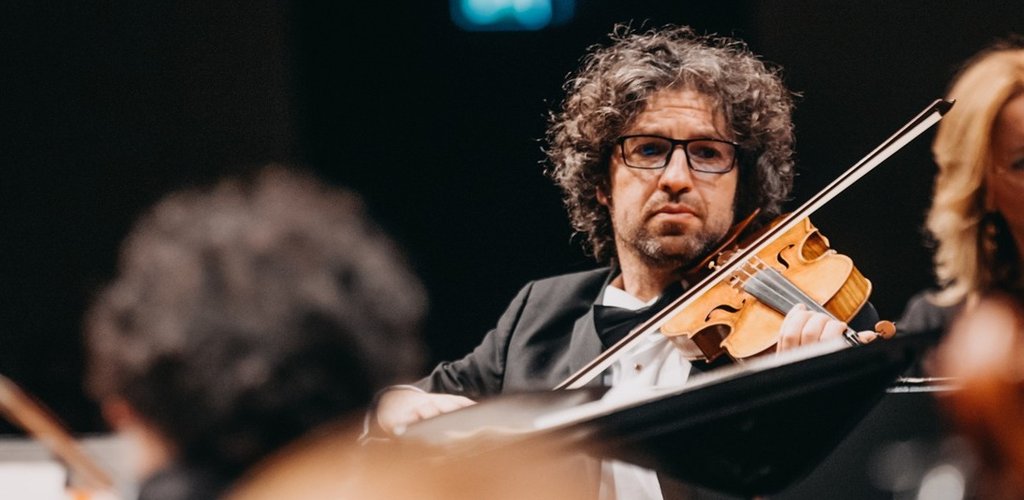At the first Concertino of the season, Daniel Bard, one of the concertmasters of BFO and a passionate supporter of chamber orchestra playing, plays a solo.
It must be a very difficult time for you being born in Israel and having your family still there. How are you, how do you feel now about the terrible war and how is your family over there?
I must admit, it is a tough and tense time for me, for us. My daughter lives in Tel Aviv with her mother. I was supposed to go there a few days ago, but my flight was cancelled, there were no flights to Israel at all. But I had a long talk with my daughter on the telephone. She is fifteen now and she planned to come to Europe. She told me not to go to Israel now, this is not the right time for anybody to go there – she said. Fortunately, for now Tel Aviv is relatively quiet, all the horrific things happen at the Gaza boarder. Israel is a small country, so everything is close.
Where do you feel at home, in Israel, in Canada or in Europe?
This is a very difficult question. I feel like the typical “wandering jew”. I always try to feel at home where I am, as quickly as I can. Therefor I worked out the habit of wherever I arrive, to unpack all my things, to put them into the closets there, to feel that this is my home at least for a couple of days.
I presume, the real home for you is the music.
That’s exactly true. That’s where I really feel at home. And for sure when I play together with the BFO, with Iván, and with my musician friends, that is a feeling of home. I always find that the people are extremely warm and embracing. I enjoy the rehearsals a lot, the way we talk to each other, so I feel really privileged to work with the Budapest Festival Orchestra as a member of this group.
Usually, you are the concertmaster at the BFO concerts, but this time you are going to be the soloist for the Shostakovich Sonata for Violin and Piano. The piece he dedicated to David Oistrakh in his late years. What do you think is the most important about this music?
Shostakovich dedicated both of his violin concertos to Oistrakh. There was a very strong connection between the two of them. There was a little funny anecdote about them. Shostakovich wanted to write a piece for Oistrakh’s sixtieth birthday, but it was ready a year earlier, for the fifty ninth birthday. That was the second violin concerto. And when it turned out, that it was too early, he thought that he had to write a new piece for the real sixtieth. That was the sonata, we are going to perform at the concert in Budapest. Oistrakh was really moved by that present.
It was 1968, when this music was born. The version you will play is the revised version, in which instead of a piano solo, the violin is supported by a chamber orchestra.
That’s right. This is the revised version, but I must admit, that I played this piece only three times in my life, twice with the orchestra and once as a soloist, and I never experienced it playing with the piano. So, this version for me is the well-known one, with that I “spent much more miles”, as with the original one.
This sonata became one of the author’s most beautiful late works, in which there are many different movements, with very different moods. What do you think about it when you play the solo?
One feels when the piece starts that we are on another planet. It’s another world. At the same time, it’s obvious that Shostakovich appreciated Bach very much, especially his fugues, that you can feel it throughout the whole sonata. Also, what he really admired, was the Jewish folk music. He said – and he took it very seriously - that the Jewish people could express their despair through their dance. This was very important for him, so the Jewish dance music is discoverable in his minor key, which is very fascinating.
